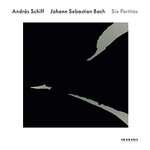|
Back
10/11/2009
Johann Sebastian Bach: Partitas, BWV 825-830
András Schiff (piano)
Recorded at the Historischer Reitstadel, Neumarkt (9/21/2007) – 252’15
ECM 2001/02 – Booklet in German and English

András Schiff triumphantly returns to the music of Bach in this complete traversal of the keyboard Partitas for ECM. Directly addressing the question of rerecording repertoire, the pianist writes in his booklet essay: "Great music is far greater than its performers. We try our entire lives to unveil its secrets and to convey its unique message. Even if we never quite reach the imaginary goal, our many performances give us experience and knowledge that was hidden from us years ago."
In general terms, the present set outdoes Schiff’s earlier Decca set in just about every way. Neumarkt’s Historischer Reitstadel – an exquisite little auditorium with superb acoustics – casts a gorgeous reverberant halo on a very well-balanced instrument. This is coupled with much clearer articulation from Schiff throughout, and the entire provides a clarity that seemed lacking on Decca.
Interpretive differences are not extreme, and many of Schiff’s agogic accents, ornamentation, rhythmic alterations and phrasing choices remain largely the same. Tempos vary here and there, and where there are significant changes, the ECM choices seem more appropriate. Notable examples include the G major Minuet and the B-flat major Praeluduim, both taken at slightly faster, more natural sounding tempos than the rather stilted earlier readings. Likewise, the clearer, more differentiated articulations in the present recording allow for increased contrast between movements. In the A minor Partita, the progression through the Sarabande-Burlesca-Scherzo is a study in varied attack on the piano, each movement given a distinctive profile. The closing Gigue then has a delicious intensity, with Schiff’s trills become extremely tight and his playing acquiring a biting momentum that drives convincingly to the final A, which in many performances sounds like an abrupt letdown.
The E minor partita, which is altogether quicker and more crisply articulated, is a triumph. The opening of the Toccata is immediately monumental and statuesque sounding, and the ensuing fugue, again taken at a quicker clip, is a masterpiece in voicing. The Gavotte is brisk and leads into Schiff’s take on the Gigue, which retains his dotted rhythms, contrasting with the "straight" rhythmic readings taken by Perahia, Gould and others. I was always skeptical about Schiff’s choice here in his Decca set, especially since there were moments where his rhythm became abruptly more free. On ECM, he is diligent and intense, and this movement convinces from first note to last. Indeed, the second disc in this set, containing only the D major and E minor suites, has instantly become one of my favorite Bach recordings on piano.
In sum, if you enjoy Schiff’s interpretations on the earlier Decca recordings, but were disappointed in the instrument and recorded sound, ECM has delivered a set that is a clear improvement.
Marcus Karl Maroney
|